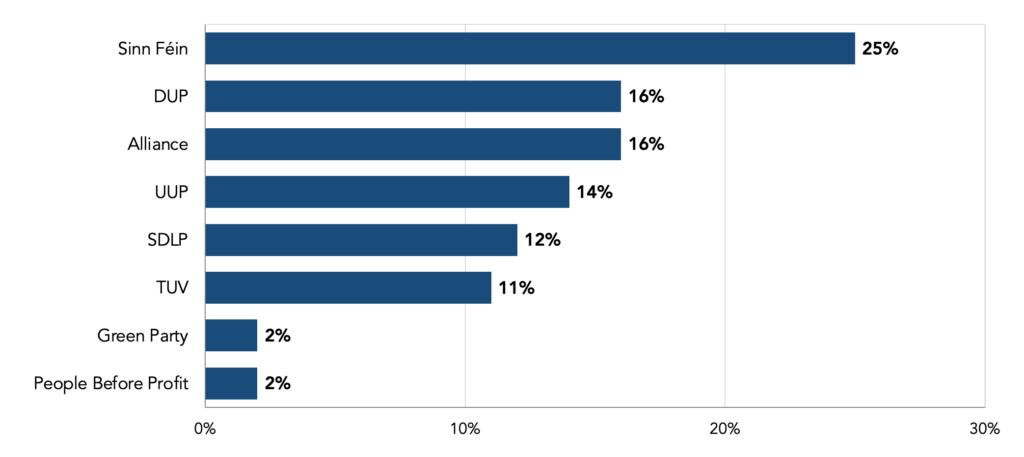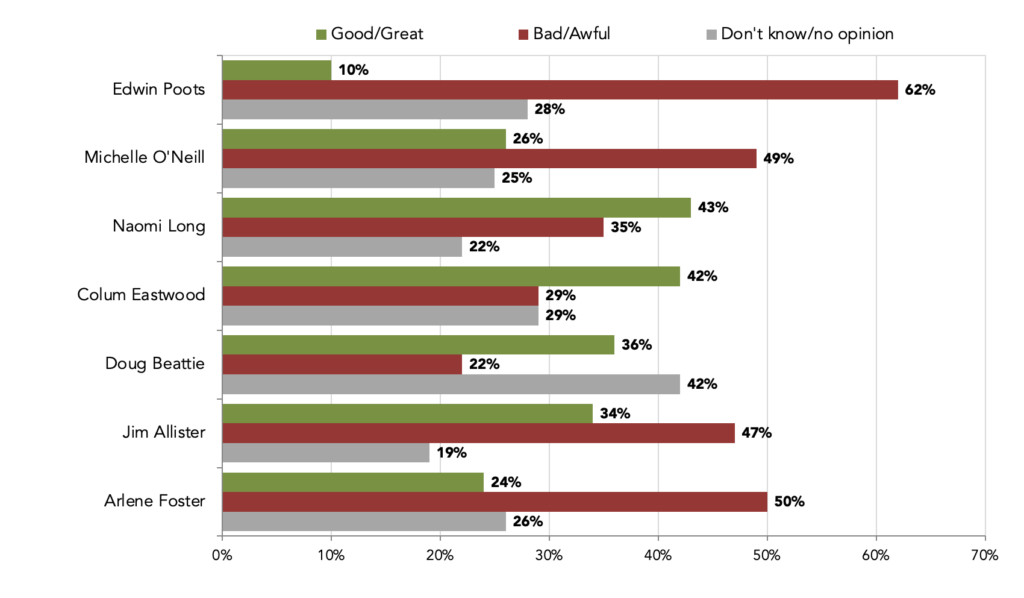LucidTalk have released the results of its regular quarterly poll, and it makes grim reading for the DUP. The party registered just 16% support, below the level they achieved in the first Assembly election in 1998 when they finished third. To cap it off, 62% of Northern Ireland voters have a negative opinion of Edwin Poots. If the new leader was hoping for a honeymoon period he’s out of luck.
Poots has the lowest approval rating of any leader, lower even than Arlene Foster who he helped oust. The timing of the poll may not have worked in his favour, as it was conducted one day after he was elected leader and the question asked about past performance. But the 62% who said he was ‘Bad/Awful’ clearly had their minds made up. Only 10% said he was doing a ‘Good/Great’ job, which means that quite a few DUP supporters don’t have a positive opinion of him. This fits with the poll’s findings that Jeffrey Donaldson was the overwhelming favourite of DUP voters, with 64% support.
It makes for pretty dire reading and he’ll need to work hard to fix his own image as well as that of the party. Appointing a more popular First Minister could help matters but this won’t be a magic solution and could lead to questions over who is really flying the plane.


It’s not all good news for Sinn Féin
Sinn Féin are up a tad and the splintering of support across other parties could open the door for them to take a few marginals. However, even though Michelle O’Neill’s favourability problem is less obvious or severe than that of Edwin Poots, just 26% think she’s doing a good job which is almost identical to the party’s support of 25%. Every other leader has favourability ratings far in excess of its party support levels, which may make them more transfer-friendly.
Still, it looks increasingly likely that Sinn Féin will come first next time around which would mean that O’Neill becomes First Minister. This would mark the first time a non-unionist serves in the role, which raises the question as to whether the DUP (or whichever unionist party emerges as the largest) would nominate a deputy First Minister. This potential crisis, which would likely trigger an indefinite period of direct rule, would be of the DUP’s own making due to a loss of support to other parties, including Alliance. The paradoxical idea that the growth of the cross-community Alliance vote could end power-sharing was always a possibility and demonstrates a weakness in the system.
The end of the ‘Surge’?
Whilst the ‘Alliance Surge’ appears to have leveled out, they’re still on course for sweeping gains. The party saw its support double from 9% in 2017 to 18% at both the European and General Elections of 2019, so this poll is within the margin of error of that. If the party wins 16% it would be their best ever performance in an Assembly Election.
They would be aiming for second seats across Antrim and Down, a third in East Belfast and have genuine targets West of the Bann for the first time. West Tyrone is the most commonly mentioned pick-up opportunity in the West, which considering that they got just 3% there last time, would be a huge achievement. Fifteen seats would be achievable, up from eight, but intra-unionist transfers mean that the party is unlikely to come second overall – at least based on these polling figures.
A potentially interesting aside is that Lagan Valley is an Alliance target with the SDLP seat or the second DUP seat in their sights. The man who took that seat last time? Edwin Poots.
A new phase for the UUP
Alliance has done very well in taking votes from liberal minded DUP voters after Brexit, but the UUP are clearly making moves to tap into that same group of voters. In the past few weeks they’ve been demonstrating their liberal credentials and have been vocal in the need to modernise under new leader Doug Beattie. They are pushing for a vote to finally prevent schools from refusing to hire teachers who’ve taught in schools of a different religion. They also sponsored the recent motion to ban gay conversion therapy which proved to be the final nail in Foster’s leadership. In both cases they jumped ahead of Alliance who have long supported both but hadn’t called a vote on either.
Pushing out Foster was almost certainly not their plan but it could prove to be an opportunity which opens the doors to a resurgence. Beattie has by far the highest share of voters with no opinion of his performance so has plenty of wiggle room to improve.
There has been a small shift towards the UUP of 1%, although it should be made clear that any movements of under 2% are within the margin of error so could just be statistical noise. Making headlines out of small movements is unwise, particularly in Northern Ireland because we’re unlikely to get another poll until the next LucidTalk poll in 4 months.
Mixed messages for Eastwood
The SDLP’s lack of progress will surely be a source of disappointment but they have at least held steady. The party was at risk of the Alliance surge and SF’s growth in the Republic but seem to have weathered that. Whether they or the UUP would come fourth in terms of seats would come down to marginals in Foyle, Fermanagh – South Tyrone and South Down. Plus, Eastwood is very well liked by Northern Irish standards.
The TUV had a very good poll but it’s unlikely that they’ll achieve that level of support in places where the candidate isn’t Jim Allister. Based on these results the party should get a second seat in North Antrim and will be close elsewhere.
For the smaller parties like People Before Profit and the Greens, polls aren’t especially useful as the margin of error is greater than the difference between a complete wipe out and trebling their seats. PBP should hold on in West Belfast but the retirement of Eamonn McCann probably ends their hopes in Foyle. The Greens, and especially Clare Bailey, could be squeezed out by Alliance in South Belfast.
What have we learnt?
Northern Ireland is increasingly underpolled, so these LucidTalk quarterly updates are our main source of information into party performance. The timing of this poll was unfortunate, with data collection starting the day after Poots was elected leader of the DUP and before Beattie was confirmed as UUP leader. All of this combines to create a poll that should be taken as an interesting snapshot in time.
Of all the party leaders Edwin Poots should be most concerned. The more moderate Donaldson was the clear favourite of the DUP base and Edwin Poots’ ascension didn’t immediately dampen the growth of the hardline TUV. He will need to thread that needle carefully to stop the slide.
Sinn Féin will be content with their own performance. As for the UUP, time will tell if the party’s more progressive shift will eat into Alliance support, but it’s not a bad start for Doug Beattie.
Technical details of the LucidTalk poll:
Polling was carried out online from 5.30pm on 14 May 14 to 1pm on 17 May 2021, targeting the established Northern Ireland LucidTalk online opinion panel (13,537 members), and which is balanced to be demographically representative of Northern Ireland. 3,072 full responses were received, with a weighted sample of 1,501 used in the analysis.
Data was weighted by age, sex, socio-economic group, previous voting patterns, constituency, constitutional position, party support, and religious affiliation. All aggregate results are accurate to a margin of error of +/-2.3%, at 95% confidence.
